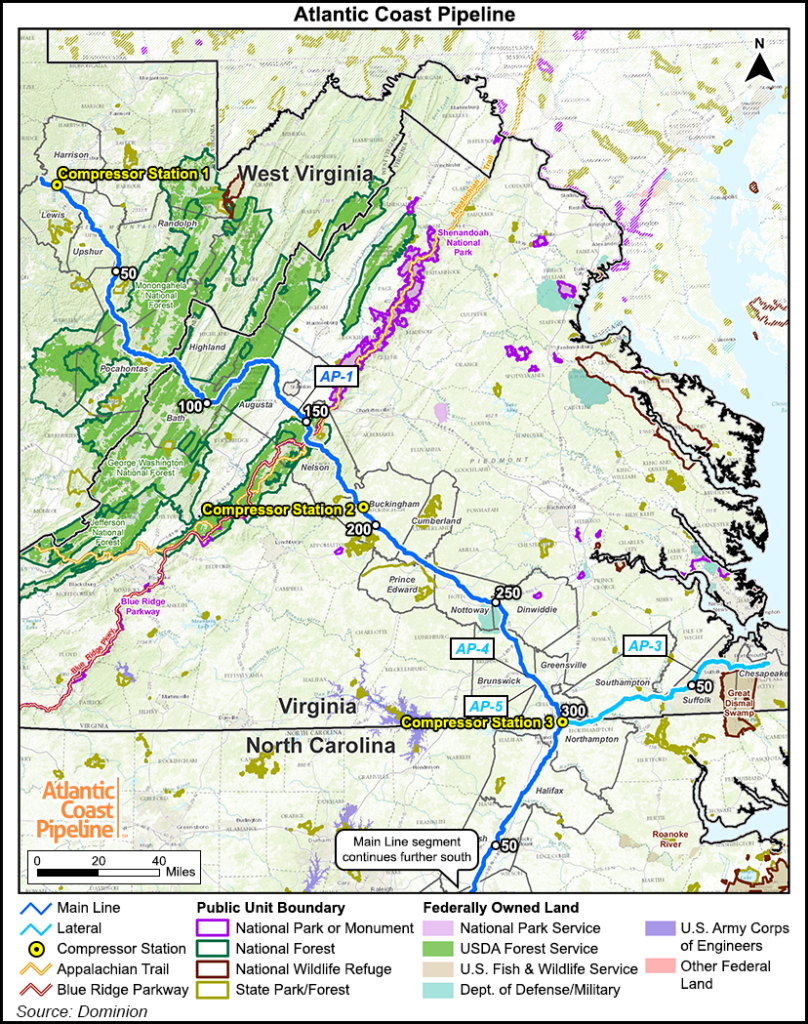Regulatory | Infrastructure | NGI All News Access | NGI The Weekly Gas Market Report
ACP Secures Last State-Level Permit in Virginia as Compressor OK’d
Virginia’s State Air Pollution Control Board on Tuesday unanimously approved a permit for Atlantic Coast Pipeline LLC’s (ACP) proposed Buckingham Compressor Station, a favorable decision for a project that found itself mired in legal and regulatory setbacks in 2018.

The air quality permit for the proposed Buckingham County, VA, facility marks the last state-issued permit needed in Virginia for the 600-mile, 1.5 Bcf/d Appalachia-to-Southeast natural gas pipeline, project sponsors said.
The board’s vote was based on a recommendation from Virginia’s Department of Environmental Quality (DEQ) and followed “months of scrutiny and review by the agency and the public,” according to DEQ.
“DEQ treated the permit application, which qualifies as a minor source by state and federal regulations, as a major source of air pollution to better ensure pollution control to the greatest extent possible under the law,” DEQ Air Director Mike Dowd said.
“DEQ’s analysis included reviewing compressor station permits across the country and scrutinizing pollution control technology. The board recognized that this permit will significantly reduce the facility’s air pollution and set a new national standard that all future compressor stations will have to meet across the country.”
ACP spokesman Karl Neddenien said Tuesday’s board vote is a “significant step forward for this transformational project and the final state approval needed in Virginia. We commend the board members and Virginia DEQ staff for the months of hard work and careful study they dedicated to reviewing this permit. We also appreciate the thoughtful input provided by members of the public.
“This permit is the most stringent air permit with the strongest environmental protections of any compressor station in the country,” Neddenien said. “As a result of the permit’s strict conditions and the unprecedented protections we’ve put in place, most air emissions at the station will be 50-80% lower than any other compressor station in Virginia.”
Like seemingly every aspect of ACP and other pipeline projects, the compressor station had been a topic of public debate and drew criticism from opposition groups who raised concerns about the facility’s location near a historically minority community.
The Buckingham compressor permit does little to address the broader questions that ACP, a joint venture of Dominion Energy Transmission Inc., Duke Energy Corp., Piedmont Natural Gas and Southern Company Gas, will seek to answer at the federal level in 2019.
After securing a Federal Energy Regulatory Commission certificate in a split vote in late 2017, ACP has had to contend with a series of unfavorable court rulings and regulatory decisions that have vacated, stayed or suspended crucial federal authorizations and halted the project’s construction progress.
In December, the U.S. Court of Appeals for the Fourth Circuit found that the U.S. Forest Service violated federal law when it authorized ACP to cross the George Washington and Monongahela national forests, and the court also tossed ACP’s permit to cross the Appalachian National Scenic Trail.
In November, Dominion pushed back the target start-up date for portions of the embattled pipeline to mid-2020, and the company upped its costs estimates for the project from $6.0-6.5 billion to $6.5-7.0 billion.
© 2024 Natural Gas Intelligence. All rights reserved.
ISSN © 1532-1231 | ISSN © 2577-9877 | ISSN © 1532-1266 |
